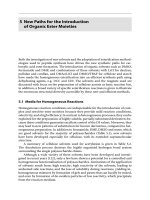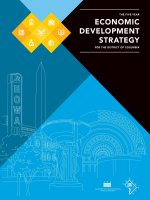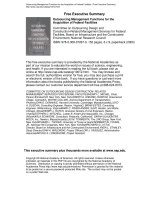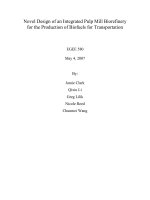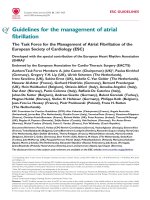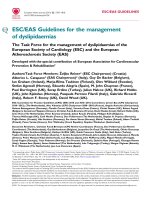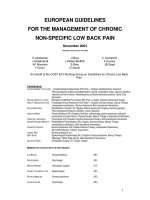Candidate Brief for the position of: Executive Director DIT Foundation pot
Bạn đang xem bản rút gọn của tài liệu. Xem và tải ngay bản đầy đủ của tài liệu tại đây (811.63 KB, 19 trang )
Candidate Brief for the position of:
Executive Director
DIT Foundation
Table of Contents
Introduction 1
Dublin Institute of Technology and the City of Dublin 2
Development of Technological University of Dublin 3
DIT at a glance 4
Civic and industry engagement 5
DIT Community 6
Campus life in DIT 6
Strategic Plan 7
The Challenges 8
About DIT Foundation 9
Mission 9
Goals 9
Activities 9
Board of Directors 10
Job Description - Executive Director 13
Organisational Status: 13
Working Relationships: 13
Roles & Responsibilities: 14
Decision Making: 15
Key Accountabilities: 15
Person Specification 16
Terms 17
How to Apply 17
1
Introduction
Dublin Institute of Technology (DIT) has been an integral part of the Irish Higher Education system
for more than a century. In that time it has continued to adapt and expand its provision to reflect a
changing society and the wider economic environment. DIT is now one of Ireland’s largest and most
innovative higher education institutions. A comprehensive, dual-sector doctoral-awarding
institution, DIT combines the academic excellence of a traditional university with professional,
career-oriented learning, preparing graduates for productive leadership roles. The core values
reflected in its mission emphasize student-centred learning, useful knowledge, rigorous processes of
discovery and critical enquiry, and support for entrepreneurship and diversity.
DIT educates some 9% of all higher education students in Ireland, with approximately 19,000
students and circa 2,500 staff. Students are registered on programmes ranging from apprenticeship,
undergraduate and postgraduate degrees, to continuing professional development and bespoke
programmes for industry. DIT is one of four degree-awarding bodies in Ireland, and each year over
4,000 graduates are conferred with their Awards.
Academic programmes in DIT are developed through our four Colleges - Arts and Tourism; Business;
Engineering and Built Environment; and Sciences and Health – underpinned by a distinctive
approach to learning and teaching. Colleagues are supported in their teaching practice by the
Learning and Teaching Technology Centre in DIT which offers a range of short courses as well as
postgraduate programmes relevant to learning, teaching and assessment at third level. All
members of the teaching staff in DIT are required to hold a qualification in third-level teaching, or
must achieve qualification within their first year of employment.
Research undertaken at Dublin Institute of Technology aims to be nationally relevant, internationally
competitive and strategically important. It is strongly focused on problem-solving, and on social and
technological development, and on innovation that advances human knowledge and makes a real
impact on people’s life experience. A community of over 800 student and staff researchers are
engaged in addressing 21st century challenges in these areas, ensuring that DIT plays a vital role in
Ireland’s transition to a smart society.
2
Dublin Institute of Technology and the City of Dublin
“Ireland’s capital city is our campus”
Dublin Institute of Technology has been a landmark in education in Dublin City for over a century,
and continues to play an important part in the cultural, social and economic life of the city.
Currently located in 39 buildings around Dublin City centre – from Rathmines on the southside to
Grangegorman on the northside – the Government announced in July 2012 that after many years
plans for the relocation of all activities on to one integrated campus at Grangegorman were to begin.
The flagship project for the government’s economic stimulus, it will combine with the new Luas BXD
line in creating significant employment opportunities during its construction, and will make an
important contribution to urban regeneration in the north inner- city.
The Grangegorman campus is located in an historic part of Dublin’s inner city, less than 1 kilometre
from the Spire in O’Connell Street. The 73 acre site is being developed as an education and health
campus and will be at the heart of a new urban quarter. In addition to bringing together all DIT
provision in undergraduate, postgraduate and research in one location, the campus will also
incorporate primary care and mental health facilities for the HSE; a multi-denominational primary
school; a public library, co-located with the DIT academic library; sports facilities for students, which
will also become available to local schools and clubs; and exhibition and performance space for the
creative arts within DIT and others.
DIT has a strong record in developing access routes to education and for civic engagement. The
Access and Civic Engagement team are already located in the Grangegorman Planning Office. While
continuing to work with communities around the city, there is now an additional commitment to the
communities in Dublin 7, adjacent to the new campus. Working with a range of partners in
education, health and training, DIT has been instrumental in establishing the Grangegorman Labour
and Learning Forum, with the objective of identifying education, training and skills gaps in the area
and providing opportunities for up-skilling and routes back in to education.
Throughout its history DIT has maintained close links with Dublin City Council. The Council has been
extremely supportive of the campus development at Grangegorman and DIT is working closely with
the planners and engineers to optimise the development in terms of urban regeneration,
sustainability and accessibility.
3
DIT is also close to industry, and delivers career-focused, professional education. Industry
representatives are involved in programme boards; advisory boards; interview panels; and as
external examiners. The DIT Corporate Partnership Network was established to facilitate
engagement between DIT and industry through one central portal. This is particularly key in
establishing connections with enterprise in the Dublin region, and providing opportunities for
collaboration in research and technology transfer. An example of that collaboration is The
Greenway – the cleantech corridor, of which DIT is a founding partner. The corridor runs from
Dublin Airport to Grangegorman and the partners include Dublin Airport Authority, Fingal County
Council, Dublin City Council, Dublin City University and DIT.
The DIT Technology Transfer service has also been very successful, in providing incubation
programmes for start-up businesses and helping students, graduates and members of staff who wish
to commercialise their research and establish businesses themselves or licence technologies to
existing businesses.
All of these activities are underpinned by a strong commitment to enhancing economic activity in
the Dublin region, and nationally.
Development of Technological University of Dublin
As Ireland’s only internationally competitive city region, Dublin’s continued development is critical to
the performance of the country as a whole. Higher Education, recognised as being pivotal in
rebuilding economic success and addressing societal issues, is a critical element in Dublin’s and
Ireland’s development. To be globally competitive, a new type of university graduate, with societal
and professional parity of esteem with traditional university graduates, is required. This graduate
has core skills in their chosen area of study and is also innovative, creative and entrepreneurial,
capable of making a real impact on the economic and social challenges facing Dublin and Ireland.
The formation of such graduates will take place in a new kind of institution, which has been
identified in the National Strategy for Higher Education to 2030 as a Technological University (TU).
DIT, Institute of Technology Tallaght and Institute of Technology Blanchardstown have come
together to form the TU Dublin Alliance, and have submitted a proposal to the Higher Education
Authority (HEA) to create TU Dublin, based on a shared vision and an agreed strategy for its
implementation. Seizing an opportunity to make real change, the new TU Dublin will be a unitary
institution, based on three campus locations.
An autonomous degree-awarding university, it will have critical mass, and will be deeply embedded
in all aspects of Dublin life. As a provider of third and fourth level technological education, TU Dublin
will work closely with enterprise, community and other partners – interdependent with, rather than
separate and aloof from its stakeholders.
4
The future
DIT is committed to responding to the challenges and opportunities that have emerged in Irish
higher education, engaging positively in institutional collaboration both nationally and
internationally, and in developing a strategy of widening participation and community engagement.
We are now preparing for the next phase of our development with the relocation of all DIT activities
to an integrated, state-of-the-art campus in Dublin’s city centre, and to the development of TU
Dublin.
DIT at a glance
• A history in Dublin city, dating back to 1887
• Dublin Institute of Technology was formed in 1978 and established under legislation in 1992
• Currently 19,000 students – from apprentice to PhD – in 2012
• 20% of student population come from outside Ireland
• 15% of DIT students are mature learners
• Students registered on programmes in four Colleges – Arts and Tourism; Business;
Engineering and Built Environment; Sciences and Health
• Educating 9% of all higher education students in Ireland
• One of four degree-awarding bodies in Ireland
• Circa 2,500 staff members of academic, administrative and support staff
• 800 students and academic staff actively engaged in research
• Ranked in the top 3% of universities internationally by THES and QS
• 4,000+ graduates each year
• Active in civic and industry engagement
• Annual budget circa €185m
• Partnerships with universities across the world
• Full active member of the European University Association and the International Association
of Universities
• Located in Dublin City centre, on six main campus sites and developing an integrated state-
of-the-art campus at Grangegorman - a 73-acre site in the heart of the inner city
• First 1,000 students arrive on new campus in September 2014, growing to 10,000 students
by September 2017
5
Civic and industry engagement
Academics and students are committed to making a significant contribution to international
knowledge and enhancing Dublin’s role as Ireland’s global gate-way.
Civic engagement and interaction with industry are emphasised both in the curriculum and in the
overall student experience. Collaboration with industry and professional bodies is embedded in
many DIT programmes and is integral to how DIT continues to adapt to the ever-quickening pace of
change globally. Many DIT students have the opportunity, as part of their programme of study, to
spend time in, or collaborate with, industry or community organisations. These experiences are an
important part of how their education at DIT prepares them for future careers. It is also an
opportunity for partners in industry to better understand the curriculum and to see how DIT
graduates can benefit their organisations.
Ranked in the top 3% of universities internationally by THES and QS, DIT is a full and active member
of the European University Association and the International Association of Universities.
6
DIT Community
The spirit of the DIT community of academic and non-academic members of staff is something which
defines the Institute and has been key to its successful development throughout its history. Circa
2,500 people are employed in DIT in many different roles. Although currently dispersed across so
many locations around the city, there has been a concerted effort to develop a ‘One DIT’ approach
to delivery of teaching and support to students. This is an important part of the planning process for
the new campus where there will be even greater scope for collaboration between disciplines,
creating synergies and opening up new opportunities.
Campus life in DIT
Student life in DIT is vibrant and inclusive. Students are actively encouraged to participate in all
decision-making fora from Governing Body to individual programme committees, giving them a
strong voice in shaping the student experience in DIT. Student support services underpin that
experience, delivering high quality, responsive and integrated support through the following:
• Careers Service
• Chaplaincy
• Counselling Service
• Disability Service
• Health Centre
• Mature Student Support
• Societies Office
• Sports and Recreation Service
• Access and Civic Engagement
The DIT Students’ Union (DITSU) also offers wide-ranging support to students, and plays a vital role
in representing the student voice at all levels in DIT.
These, and other support services, aim to help students in achieving their academic goals, but also to
allow them the scope to develop as well-rounded individuals.
There are more than 80 student societies, established and run by students and reflecting their
diverse interests from music to fashion, from political debate to design. There are also 40 different
sports clubs, including team sports and individual skills. In addition to making the most of
opportunities for their own enjoyment and development, students in DIT are encouraged to
participate in a range of volunteer programmes that provide much needed assistance to community
and non-profit organisations. For information on campus life in DIT see www.dit.ie/campuslife
7
Strategic Plan
The 2011-2014 Strategic Plan continues to be built around the Institute’s three main strands of
activity:
1. Learning and Teaching and the assimilation of knowledge;
2. Research and Scholarship and the creation of knowledge; and
3. Engagement with industry, community, academia and the public sector in the support of the
transfer of knowledge.
Underpinning the core enterprise of the Institute are strands concerned with delivering excellence in
Student Services, utilising the skills and knowledge of our people, the organisational development of
DIT to ensure institutional effectiveness and that we are fully responsive to the needs of our key
stakeholders and the need to operate efficiently and effectively within our financial resources.
Vision
Recognised internationally, DIT will be the first choice in Ireland for people who seek professional,
career-focused learning and discovery in a vibrant environment renowned for innovation, creativity,
the application of research and engagement with the community.
Mission
Located in the heart of Ireland’s capital city, DIT provides an innovative, responsive and caring
learning environment for a diverse range and level of programmes to students of all ages and
backgrounds. In doing so, DIT:
combines the academic quality of a traditional university with career-focussed learning,
discovery and the application of knowledge
emphasises excellence in learning, teaching, scholarship, research and support for
entrepreneurship,
contributes to technological, economic, social and cultural progress, and
is engaged with and within our community.
Values
Student-Centred - Students know what, when and how they will learn and be assessed on
each specific part of their programme with opportunity to provide timely feedback on
programme content and delivery. Library, ICT, social and specialist resources provide
environments for individual and group work that form integral parts of programmes.
Administrative services and supports are of a quality to facilitate students to fully participate
in their programmes of study and are appropriately responsive to their needs.
8
Useful - Preparing students for professional careers, including exposure to international
perspectives, emphasising the importance of integrity, responsibility and entrepreneurial
skills alongside the utility of knowledge and contributions to economic social and cultural
development.
Challenging - Challenge orthodoxy via rigorous processes of discovery, critical enquiry and
innovation. Making distinctive, relevant and timely research contributions to advance
human knowledge.
Inclusive - Striving to create a friendly, collaborative and trusting community, where
diversity is valued, individuals are treated with respect, encouraged to develop their
potential and make their contribution, and pride is shared in our collective identity.
Open, honest, professional and accountable - Proactive sharing of information; acting in the
Institute’s best interests; with devolved authority and accountability for decisions and
actions within a framework of regulations, policies and procedures.
The vision and mission of the future Technological University (TU) of Dublin draws on the values of
DIT and our partners in the TU Dublin Alliance, and will build on their strengths.
The Challenges
Today DIT operates in an increasingly complex higher education landscape. Changing student
patterns and demands; the increased focus on up skilling; lifelong learning and fourth level
provision; the shift in economic needs towards higher value added operations including increased
marketing, internationalisation and R&D; a move to a new HEA funding model, along with pressures
from stakeholders for efficiencies, the enhancement of practical skills and value for money, all
contribute to the drive for DIT to review, develop and enhance its offerings and operations.
9
About DIT Foundation
The DIT Foundation is a not-for-profit organisation and registered charity (CHY 14226) that raises
and manages gifts from individuals, corporations and foundations for the benefit of the Dublin
Institute of Technology (DIT).
Mission
The DIT Foundation was established in 2001 to advance the mission of DIT and thereby facilitate an
innovative, responsive and caring learning environment for a diverse range and level of programmes
to students of all ages and backgrounds
Goals
Specifically the current goals are to:
Co-ordinate a major fundraising campaign to provide the philanthropic funding of €30
million, required for the new campus at Grangegorman.
Generate financial support for teaching programmes & research.
Support the development of the DIT Access and Civic Engagement programme
Create opportunities for the Foundation to engage with graduates and other potential
donors.
As the Foundation evolves additional goals may be included.
Activities
It is by building philanthropic relationships with friends, corporations, alumni and foundations that
DIT Foundation demonstrates the unique culture of DIT and the power of higher education to
change lives. Examples of current activities include:
Scholarships – both international & domestic scholarships help students to reach their full
potential
Outreach Activity – investing in the DIT Access programmes for students from
disadvantaged backgrounds; a music programme for young people in Ballymun; supporting
the students to work with community and voluntary groups.
DIT Annual Fund – building a fund with alumni and staff support and investing donations in
student educational support; student services (including clubs and societies); excellence in
teaching and research; and community projects.
Legacy Fund Management - such as the Michael O’Donnell Memorial Fund for engineering
teaching and research.
Corporate Engagement - creating opportunities for companies to engage with the DIT brand
such as Toyota, Vodafone, Penneys and Bord Gáis Energy.
For further information visit www.ditfoundation.ie
10
Board of Directors
There are currently nine directors on the board of DIT Foundation:
Mr. Peter Coyle
Mr. Jim Gahan
Prof. Neville Hogan
Mr. David Kennedy
Mr. Bobby Kerr
Mr. Eugene McCague (Chairman)
Prof. Brian Norton
Dr. Noel O’Connor (Secretary)
Mr. Pat Quinn
Board Biographies
Mr. Peter Coyle
Peter Coyle spent over 30 years working on the development of Irish industry and the Irish economy
with the Industrial Development Authority (IDA) and latterly Enterprise Ireland. In his role with
Enterprise Ireland Peter was Executive Director with responsibility for International Marketing. He is
now a company director and business consultant. Peter was also a member of the Governing body of
Dublin Institute of Technology (DIT) for over 15 years.
Mr. Jim Gahan
Jim Gahan is a Chartered Surveyor with over 35 years experience, in both the public and private
sectors. He has previously held the positions of Deputy Chief Valuer, Dublin City Council; Commercial
Director, Custom House Docks Development Authority; Group Property Manager, CIE and Property
Investment Director, Cosgrave Property Group. He now works as an independent Property
Consultant. He was Chairman of the Society of Chartered Surveyors in 1989 and has been Chairman
of the Education Board of The Society of Chartered Surveyors for the past 20 years. Jim has many
years involvement in education matters with the Dublin Institute of Technology.
Professor Neville Hogan
Neville Hogan is Professor of Mechanical Engineering and Professor of Brain and Cognitive Sciences
at the Massachusetts Institute of Technology. He is Director of the Newman Laboratory for
Biomechanics and Human Rehabilitation and a founder and director of Interactive Motion
Technologies, Inc., a company offering innovative robotic tools to study and treat neuro-motor
impairments. Born in Dublin, Ireland, he obtained a Dip. Eng. (with distinction) from Dublin Institute
of Technology and M.S., M.E. and Ph.D. degrees from the Massachusetts Institute of Technology.
Following industrial experience in engineering design, he joined MIT’s school of Engineering faculty
in 1979 and has served as Head and Associate Head of the MIT Mechanical Engineering
Department’s System Dynamics and Control Division. He has been awarded Honorary Doctorates
from the Delft University of Technology and the Dublin Institute of Technology and the Silver Medal
of the Royal Academy of Medicine in Ireland.
11
Mr. David Kennedy
David Kennedy is a director of a number of companies in Ireland and overseas, including CRH, the
Manchester Airport Group plc, Bon Secours Health System Limited, Drury Communications Limited,
Pimco Funds Global Investors Series plc. David was formerly Chief Executive of Aer Lingus.
Mr. Bobby Kerr
Bobby Kerr grew up in Kilkenny where his family owned the Newpark Hotel. He qualified with an
Honours Certificate in Catering Management from DIT's Cathal Brugha Street college in 1981 and
embarked on a career which included work on North Sea oil rigs, sports stadia in Canada and Jury’s
Hotel in Ballsbridge before joining Campbell Catering as manager of the bar and food outlets in
University College Cork in 1987. He remained with Campbell for 11 years rising to the position of
Development Director and overseeing development of the Bewley brand in The UK, USA and Japan.
He opened his first coffee shop in 1999 and through various mergers and acquisitions he emerged in
2003 as principal shareholder and CEO of Insomnia Coffee Company which he has developed to a
chain of 50 shops. In 2008 he became a Dragon on the Irish version of The Dragons' Den television
program and has made a number of investments in companies that pitched for financial support on
the programme.
Mr. Eugene McCague
Eugene McCague is Chairman of Arthur Cox one of Ireland’s leading corporate law firms where he
specialises in corporate law and governance. He was President of Dublin Chamber of Commerce for
the year 2006. He was the first practising lawyer to have been elected President of the Chamber in
its 223 year history. Eugene is a former member of the Board of the Health Services Executive which
is in charge of the health service in Ireland. He has also served as Chairman of the Governing Body of
the Dublin Institute of Technology and on the boards of Glencree and Co-operation Ireland. He is the
author of a biography of Arthur Cox, the founder of his firm and is married with three children.
Professor Brian Norton
Professor Norton became the second President of Dublin Institute of Technology in September 2003.
He holds doctorates from Cranfield University and the University of Nottingham, is a Fellow of the
Irish Academy of Engineering, the Institution of Engineers of Ireland and the Energy Institute and is a
Chartered Engineer (both in Ireland and the UK) and a member of the Higher Education Academy. He
is an Honorary Professor of the University of Ulster and co-author of over 140 journal papers in the
field of solar energy. Professor Norton has chaired many national and international bodies in the
fields of renewable energy and construction. He chaired the Northern Ireland Business Education
Partnership and was Specialist Advisor to the Committee for Enterprise, Trade and Investment of the
Northern Ireland Assembly. He is currently a member of the NI Government Energy Policy Steering
Group and Chair of Action Renewables which is responsible for renewable energy in Northern
Ireland.
Dr. Noel O’Connor
Noel is Director of Student Services at the Dublin Institute of Technology (DIT). He has overall
responsibility for the management and development of student services within DIT. This covers a
12
range of areas including the careers service, sports & recreation, medical services, community links,
the international office and student administration services. In addition, his Directorate is
responsible for planning the relocation of DIT to a new urban campus at Grangegorman in Dublin’s
north inner city.
Noel is an academic with a background in management education, and tourism development and
has a particular interest in curriculum design and development within higher education. For many
years he lectured in strategic management in DIT and was Head of the School of Hospitality
Management and Tourism. He is a graduate of DIT, TCD, UCD and NUI Maynooth.
Mr. Pat Quinn
Pat Quinn was born and grew up in Dublin. He qualified as an Engineer at the College of Technology,
Bolton Street and in 1956 emigrated to Canada where he was a founding partner of Quinn Dressel
Associates. His firm became one of Canada’s foremost structural engineering firms responsible for
many landmark buildings throughout North America, Europe, the Middle East and Asia including
Calgary City Hall, the Elf Aquitaine Tower in Paris and Shanghai Stock Exchange. Pat has been
President (twice) of the Professional Engineers of Ontario, is a Fellow of the Canadian Academy of
Engineering and a Fellow of the Institution of Engineers Ireland. He has served on numerous
statutory and non-statutory bodies addressing both engineering and socio-economic matters and
has a particular interest in the issues of Women in Engineering and Violence against Women. He has
had several works published on engineering matters and was awarded an Honorary Doctorate by DIT
in 2007.
13
Job Description - Executive Director
Reporting directly to the Chair of the Foundation and the Board, the Executive Director of the DIT
Foundation is responsible for the overall leadership and management of fundraising activities on
behalf of DIT, including providing executive leadership for the current €30 million Grangegorman
Capital Campaign, and managing major gifts, gift planning, annual giving, communications, donor
relations, board relations, financial operations, investment management and advancement services.
The Executive Director also works directly with the President and academic leadership of DIT to
solicit financial support for the strategic priorities of the Institute.
The position’s major responsibility is to plan and implement programmes and strategies to assist DIT
in achieving its goals through fundraising and other outreach efforts designed to enhance the DIT’s
position as a leading third level academic and research institution. The Executive Director in
cooperation with the Chair of the DIT Foundation, the DIT President and DIT Senior Leadership Team
will establish a vision and strategic direction for funding programs that seek to involve graduates and
friends in advancing and supporting the fundraising priorities of DIT in conjunction with the
academic community at the Institute while advancing DIT’s institutional mission and goals.
Organisational Status:
The Executive Director reports directly to the Board of Directors of DIT Foundation.
The Executive Director is responsible for the strategic leadership of the DIT Foundation to ensure its
future relevance, credibility, and viability. He/she is responsible for establishing organisational
objectives and priorities and for reviewing and evaluating the progress and work for attainment of
objectives and performance goals.
The Executive Director will work in close co-operation with the Chair of DIT Foundation, the
President of DIT and the DIT Senior Leadership Team. He/she will meet with and report to the Board
of the Foundation on a regular basis and will from time to time at the request of the President of DIT
meet with the President, Governing Body of DIT and the DIT Senior Leadership Team.
Working Relationships:
To ensure the best results, the Executive Director will actively facilitate collaboration and
partnerships with DIT’s President and Senior Leadership Team and stakeholders and by personally
promoting awareness of the Foundation’s work to the wider public.
Internal Relationships
Works directly with the DIT Foundation Board of Directors and the DIT Director of Student Services
to develop organisational policies in support of the Foundation’s mission. The incumbent guides the
development of strategic and operational plans for executive management. The Executive Director is
also responsible for developing and maintaining strategic relationships with the DIT President’s
14
Office, Public Affairs Office, Graduate Network, Corporate Partnership Network, Campus Planning
Team and the Senior Leadership Team to progress the DIT Foundation’s mission.
External Relationships
The Executive Director interacts directly with prospects, major donors, leading philanthropists,
community and industry leaders.
Roles & Responsibilities:
Strategic Organisational Management:
The Executive Director
- Provides the DIT Foundation with the strategic leadership and vision to undertake the core
mission of the Foundation.
- Maintains staff focus on its mission and vision and balances organisational priorities through
an inclusive strategic planning and management system.
- Seeks out opportunities to improve the Foundation’s operations and to integrate
organisational philosophy with mainstream DIT programmes (where applicable) and thereby
function as a strong, cohesive operation.
- Develops policies and strategies for financial management including all revenues, expenses,
endowment funds, and investments. Ensures rigorous accountability and long term stability
through the conservative fiscal management of resources and endowments.
- Guides and integrates colleague’s efforts to align all business processes and reinforce
organisational structure.
- Ensures the effectiveness of major programmes and initiatives by focusing energies and
operations to achieve agreed upon objectives.
- Encourages and facilitates the application of technology to enable the re-engineering of
programmes and processes to make optimal use of resources.
- Leverages the significant resources of DIT in terms of students, staff, alumni, industry
partners, organisational activities to optimise fund raising potential of the DIT Foundation.
- Ensures that the DIT Foundation and its activities become a major resource available to
underpin the work of DIT in the decades to come.
Fundraising:
- Ensures that the DIT Foundation generates an appropriate rate of relationship fundraising,
solicitation of gifts and pledges and major gift donations to the Foundation.
- Provides the leadership and long term vision necessary to significantly increase the DIT
Foundation's fundraising return on investment.
15
- Develops new initiatives to ensure resources are available to support its programmes by
working closely with the board of DIT Foundation, the President of DIT and DIT Senior
Leadership Team.
- Leads staff and volunteers in developing and implementing strategies to ensure successful
philanthropic and fundraising campaigns.
- Identifies, involves, educates and cultivates corporate and individual major prospects.
- Solicits and stewards major individual and corporate donors, providing accountability and
recognition.
- Meets annual fundraising targets, with a specific focus on securing the first phase of
philanthropic investment of €8 million for the new DIT Campus by 2015.
- Supports the Campaign Chair and Campaign Committees in the delivery of targets to achieve
the overall €30 Capital Campaign Strategy for DIT Grangegorman
Decision Making:
Exercises judgment in researching, organising, analysing and presenting information to assist the
Board of Directors in setting DIT Foundation strategies and decisions. Exercises discretion when
communicating with prospects and in the development of recommendations and proposals.
Key Accountabilities:
- Develop and diversify income streams, putting DIT Foundation on a continued stable
financial footing
- Form a strong, effective and open working relationship with the Chair of DIT Foundation,
Board of Directors, DIT President, DIT Director of Student Services and work with them to
grow and sustain the Foundation.
- Position the DIT Foundation as the central body driving philanthropy and fundraising for DIT.
- Manage the DIT Foundation, provide strategic direction and lead change.
- Position the DIT Foundation as a team with the highest standards and integrity
- Represent the DIT Foundation at a national and international level and where necessary and
manage relationships with media, government, peer bodies and other external organisations
- Foster transparency and accountability on governance and all financial reporting.
- Oversee the four strategic goals of the DIT Foundation (outlined above) and in particular the
philanthropic activity for the new campus at Grangegorman.
16
- Attend all Board meetings of DIT Foundation and meetings of the DIT Student Services
Executive, when required.
- Prepare plans for the DIT Foundation’s operations and philanthropic activity on an annual
basis.
Person Specification
Experience and knowledge
- A third level qualification and/or professional qualification and minimum of five years senior
management experience, including human resource and financial management, education
and training
- Demonstrate a minimum of three years experience and success in leading fundraising
activities and/or achieving fundraising targets (preferably in a higher education
environment)
- Demonstrated experience in business development, relationship development and
management, strategic positioning and partnership management
- Proven experience in representing an organisation at a senior and wider community level
Skills and abilities
- Demonstrated ability to develop and lead a team of professional staff
- Demonstrated effective interpersonal skills, including the ability to facilitate and lead high-
level negotiations using appropriate techniques and influencing styles to achieve desired
outcomes
- Outstanding interpersonal, oral and written communication skills, appropriate to dealing
with stakeholders and supporters including donors, volunteers and friends of the Institute
- Experience with relationship management database applications
Personal Qualities
- Assertive and confident
- Judicious and astute
- Politically sensitive, with diplomacy and cross-cultural sensitivity
- An encouraging and supportive leader
- Preparedness for frequent travel and after-hours work
17
Terms
Term of appointment
The initial appointment will be for five years with a one year probationary period. The DIT
Foundation may offer reappointment for a further term after consultation with the appointee and
following a performance review towards the conclusion of the initial term.
Remuneration package
An appropriate and attractive remuneration package will be offered to the appointee.
Performance and development
The appointee will meet the Chair of the DIT Foundation and the DIT Director of Student Services to
develop a performance and development plan that sets out performance targets, key objectives and
performance requirements and any development activities designed to assist the appointee.
How to Apply
Applications must be made through the Dublin Institute of Technology online recruitment system. As
part of the online application procedure applicants will be asked to upload a CV to include details of
references.
To apply for this post please log on to www.dit.ie/vacancies
Closing Date
26
th
April 2013
Selection Process
Interviews will be scheduled for the end of May.
